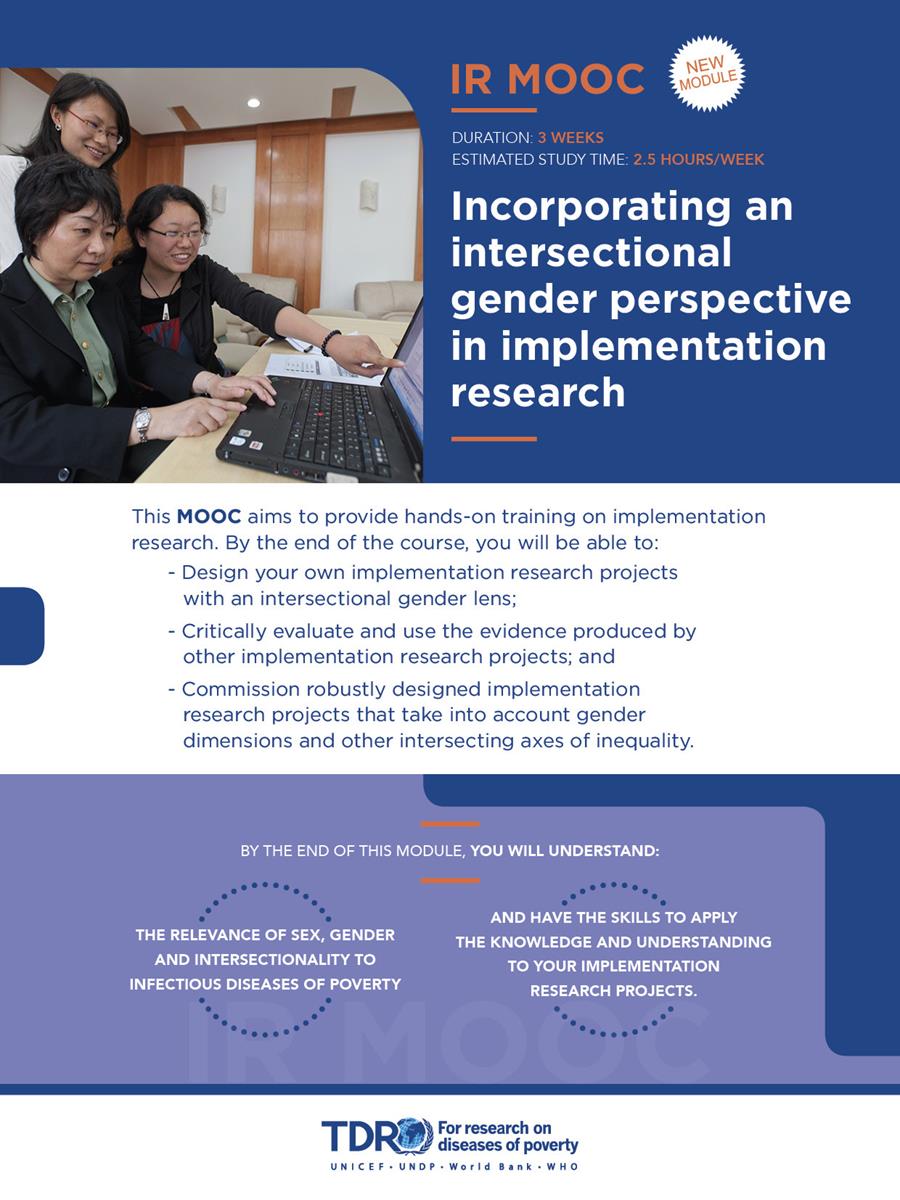Deadline to register: 8 June 2022
Enrollment in this course is open to all applicants on a first come, first served basis. Sessions will be held in all WHO regions. This MOOC and certificate of attendance are offered for free.
The course starts on 20 June 2022.
Gender and infectious disease research
Great progress has been made towards combating infectious diseases of poverty, most notably through large-scale and coordinated disease control programmes. However, considerable public health challenges remain, ranging from global environmental challenges to gender and intersecting inequalities that have an impact on health conditions associated with infectious diseases in low- and middle-income countries (LMICs).
Gender is a social determinant of health that influences a person’s risks from exposure, and vulnerability to disease. Gender norms, roles and relations influence a person’s susceptibility to different health conditions, their access to, and uptake of, health services, and the health outcomes they experience throughout their life-course.
Sex and gender are key drivers of health outcomes as they can affect delivery and access to health products and services for infectious disease prevention and control. TDR recognizes this and aims to ensure that research programmes adequately and appropriately address sex and gender and their intersections with other drivers of inequalities, discrimination and privilege.
Speaking about TDR’s focus in this area, TDR Director John Reeder says, “Gender has always been a critical area for TDR; we know that gender roles influence vulnerability to infectious diseases, access to healthcare in LMICs and how people respond to disease and treatment.”

Represents how gender intersects with other social and economic characteristics within the intersectionality wheel, emphasizing gender as the entry point into intersectional gender analysis.
The next generation of gender research in TDR will prompt researchers to go beyond studying individual social characteristics such as gender, age, (dis)ability, skin colour, sexual orientation or social status, to explore how gender interacts with these different social categories to privilege or disadvantage people within broader structural systems of power and discrimination.
TDR’s gender research efforts are led by scientist Mariam Otmani del Barrio, who remarks, “It’s important to understand interactions of social categories and factors across population groups and geographical locations to determine health inequalities: why and how health is shaped in a specific way and what influences vulnerability to infectious diseases.”
New TDR strategy on intersectional gender research
An intersectional gender lens is important for inclusive and responsive infectious disease research programmes and universal health coverage efforts towards “leaving no one behind”. TDR supports and promotes an intersectional gender approach to research, ultimately focusing on the impact of gender dynamics and interconnected inequalities for the prevention and control of infectious diseases of poverty.
More specifically, TDR focuses on the following core areas:
- Building research capacities on intersectional gender analysis in research on infectious diseases.
- Supporting intersectional gender analysis in research for implementation, to generate new evidence and knowledge on the intersections of gender and other social variables that influence the way in which implementation strategies work.
- Generating evidence on gender-intersecting inequalities in access to health services and those that influence differentials in vulnerability to, and the impact of, health conditions associated with infectious diseases in LMICs.
- Promoting an inclusive infectious disease research agenda that recognizes the health needs of women, girls, men, boys and people in all their diversity, including those with non-binary identities.
Mariam Otmani del Barrio explains further, “At TDR, we are working to strengthen an inclusive research agenda, moving away from equating gender with women as a homogeneous category. We want to study drivers of inequalities that affect the health of women, men, and people who do not fit into these binary-identities. This will help us design gender-responsive health interventions to prevent and control infectious diseases”.

